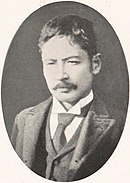The gate from Tokyo
The gate from Tokyo ( Japanese 坊 ち ゃ ん , Botchan) is a novel by the Japanese writer Natsume Sōseki (1867-1916). The novel was published in 1906 as an "appendix" (not as a separate volume) to the magazine "Hototogisu". The book was later reprinted and translated many times. The late German translation from 1990 comes from Jürgen Berndt . The book, which is divided into 11 chapters, is about the young teacher from Tōkyo who starts his first job at a school in the province. In the book, Natsume processed memories of his teaching activity in Matsuyama on Shikoku in 1894 .
content
In the first chapter, the first-person narrator reports that housekeeper Kiyo lovingly called him "Botchan", which is a belittling of the term "Boya" (坊 や) - "Boy". He then reports on his youth with difficult parents and a difficult brother. After his parents passed away, his brother gave him an amount of money from the inheritance that the narrator could use to pay for a three-year course to become a physics teacher.
In the next few chapters, the narrator takes up his position at a school in a provincial town. He is introduced to his colleagues and reports in a short letter to Kiyo about the nicknames he has given them. He finds a room in an inn whose owner is determined to sell him paintings and ink stones. His students, who discovered him in a noodle diner, mock him with the noodles. They also know that he, like his colleagues, drives to the nearby thermal baths. The narrator is assigned to the night watch in the boarding school, where the students put grasshoppers in his bed and later make noise outside.
A conference is held on the incident, and colleagues are of the opinion that the youth should not be punished too much. His host wants to get rid of him, he moves out and looks for a new room and finds one with a nice old lady. She knows about the gossip in town, knows that the men are after a pretty girl called "Madonna". Madonna was supposed to marry "Pumpkin", that is, the Chinese teacher. The new landlady warns the narrator that he too should get married soon.
A celebration is held to mark the victory over China in the Sino-Japanese War from 1894 to 1895 . This is followed by an extensive party in the evening at which the pumpkin, which the colleagues want to get rid of, is bid farewell. He has to go to the even deeper province and thanks him respectfully. The celebration ends in a fight in which the narrator is injured. The newspaper reported about it and blackened him and his colleagues "porcupine". He is fired, so the narrator quits. Before they leave, they beat up the blackers.
Back in Tōkyō, the young teacher finds work with a tram company for a wage that is only almost half as high as his previous teacher's salary.
Post Comment
Despite the time lag, the book is still very popular in Japan today, because “school” is always associated with the memory of strange teachers and student pranks. Famous in Natsume's book are the nicknames that the young teacher ascribes to his colleagues in the story. Natsume, who processes his memory of his brief teaching activity in the book, indicates - as in his other books - how big the difference was between the urbane metropolis of Tōkyō and the simple province around 1900. In order not to portray the teacher too carefully, the teacher from Tōkyō is marked in the story as somewhat ignorant of ancient art and of Bashō's poems, the haiku .
The translator Berndt leaves the text free of footnotes or reference numbers, so that you stick with Natsume's text and do not switch straight to the small print or the glossary (which is also available here). However, there is no reference in the glossary to the fact that the thermal bath visited is the actually existing Dōgo Onsen .
Appreciation
Berndt points out in his afterword that Natsume himself is still trapped in the petty-bourgeois world, but sees that a new social structure of equality is necessary. He continues, "With biting mockery, with superior irony, he showered society, the intellectuals of his day, not without self-mockery, not without self-irony."
Used book editions
- The gate from Tokyo . Translated by Jürgen Berndt and Shinohara Seiei. With explanations of the Japanese terms and an afterword by Berndt. Theseus Verlag, 1990, ISBN 3-85936-038-8 .
- Botchan . Tuttle, 1968. ISBN 0-8048-0071-5 . English, originally published in 1922
- Botchan . In: Natsume Sōseki zenshū 5 . Chikuma Bunko, 1987. Afterword by Yoshida Seiichi . ISBN 4-480-02162-0 .
- Botchan . Shincho Bunko, 1979. Afterword by Jun Etō . ISBN 4-10-101003-X .
